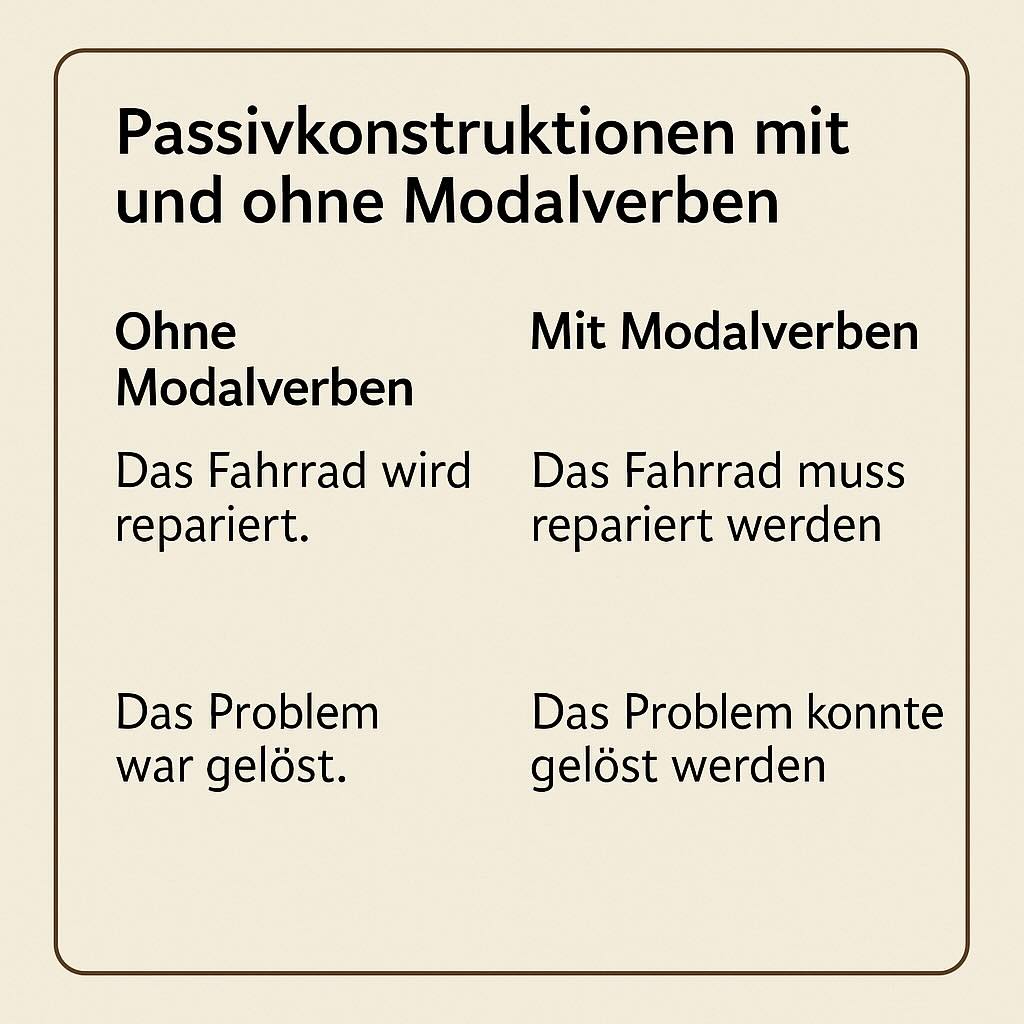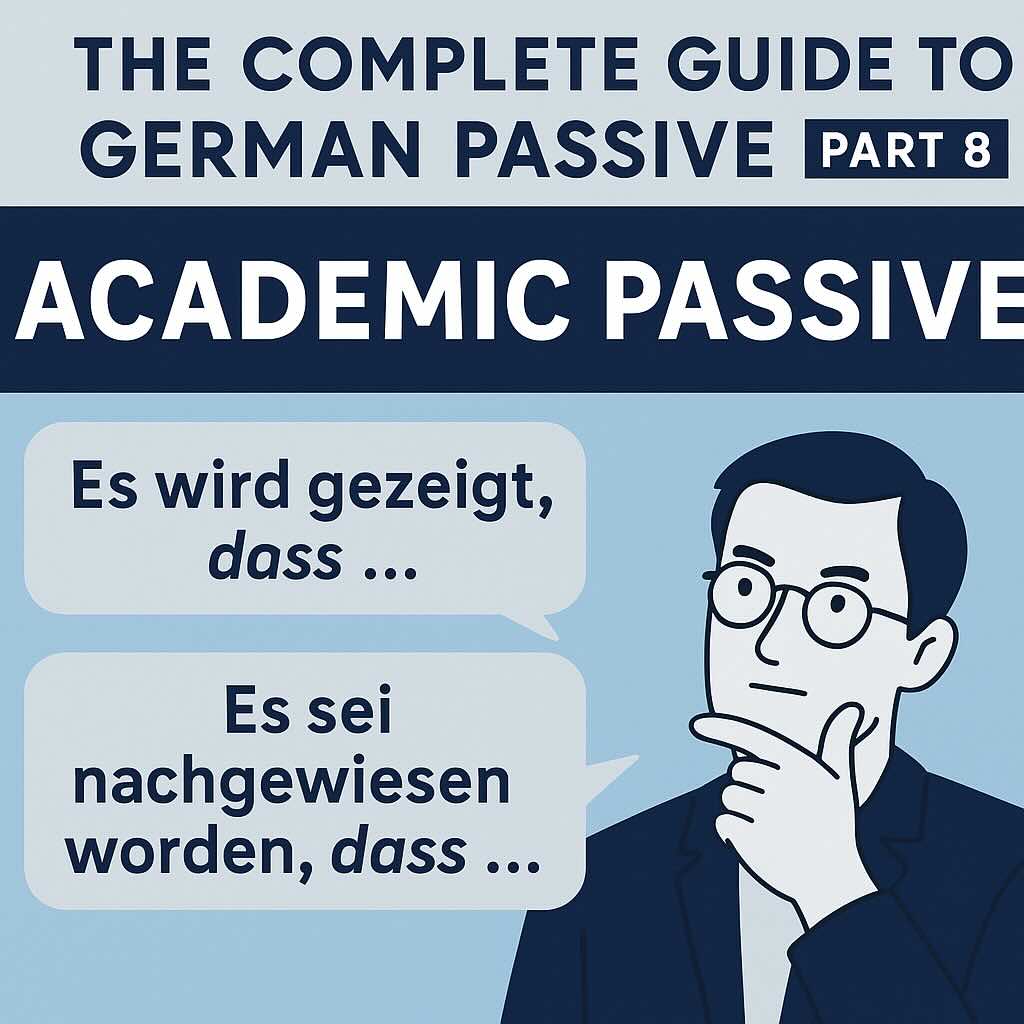The Academic Passive (Gelehrtenstil / Scientific Passive)
“In academic writing, it matters less who does the work — what matters is that it is shown, proven, or discovered.” — Tymur Levitin
The paradox before we start: formality vs. readability
In German academic writing, passive is the default:
- Es wird gezeigt, dass …
- Es wurde festgestellt, dass …
But:
- Logic says passive hides the agent, so it can make texts heavy and unclear.
- Style guides (Duden Stilwörterbuch, IDS) recommend balancing passive with clear active structures.
- Methodical exam prep still pushes passive as the “correct academic style.”
👉 Paradox: In university writing you are told “avoid too much passive,” but in exams you’re expected to demonstrate it.
1) What is the Academic Passive?
It’s the use of werden-Passiv (or sometimes es wird … constructions) to depersonalize statements in academic/scientific style.
- Wir zeigen, dass diese Methode funktioniert. (active, personal)
- Es wird gezeigt, dass diese Methode funktioniert. (academic passive, impersonal, more formal)
The subject (wir) disappears — the result or finding takes center stage.
2) Core constructions
- Es wird gezeigt, dass … → “It is shown that …”
- Es wurde festgestellt, dass … → “It was established that …”
- Es wird angenommen, dass … → “It is assumed that …”
- Es ist nachgewiesen worden, dass … → “It has been proven that …”
3) All tenses in Academic Passive
| Tense | Academic Example | English |
|---|---|---|
| Präsens | Es wird gezeigt, dass … | It is shown that … |
| Präteritum | Es wurde festgestellt, dass … | It was established that … |
| Perfekt | Es ist nachgewiesen worden, dass … | It has been proven that … |
| Plusquamperfekt | Es war nachgewiesen worden, dass … | It had been proven that … |
| Futur I | Es wird gezeigt werden, dass … | It will be shown that … |
| Futur II | Es wird nachgewiesen worden sein, dass … | It will have been proven that … |
4) Typical fields and uses
- Science & research: Es wird untersucht, wie …
- Legal writing: Es wurde beschlossen, dass …
- Academic exams: Es wird gefordert, dass die Kandidaten …
5) The pitfalls (and contradictions)
A) Overuse vs. requirement
- Style guides (Duden Stilwörterbuch, IDS) say: too much passive = heavy, unreadable. Recommended: mix passive and active.
- Exam handbooks say: use passive to depersonalize → it’s the “proper” academic voice.
👉 Paradox: in real academic publishing, clarity wins; in exams, passive marks formality.
B) The dummy subject “es”
- Required in academic style for formal impersonal passive.
- But: method books sometimes oversimplify, teaching “Es wird gesagt …” = the only correct shape.
- In reality, word order allows dropping es when another element fills first position (In dieser Studie wird gezeigt …).
C) Perfect passive with modals
- Logic/Duden: sei / wäre … werden können (with sein).
- Methodical norm: habe / hätte … werden können (with haben).
- Exams accept only haben.
👉 Same paradox as in Part 4 and Part 7, now inside academic phrasing.
6) Examples of contradictions
- Duden / Grammis (logic):
“The auxiliary in perfect passive should be sein.”
→ Es sei nachgewiesen worden, dass … - Exam handbooks (method):
Es habe nachgewiesen werden können …
→ Accepted in exams, even if logically inconsistent.
📌 For survival: know both. Use haben-forms in exams, but be aware of sein-logic for deeper understanding.
7) Comparison: Active vs. Academic Passive
- Active (personal, lighter):
In dieser Arbeit zeigen wir, dass … - Academic Passive (formal, heavy):
In dieser Arbeit wird gezeigt, dass …
👉 Many modern universities encourage a balance: don’t hide behind passive too much.
8) Exam survival
- Use academic passive frequently in exams: es wird gezeigt, es wurde festgestellt, es ist nachgewiesen worden …
- For Konjunktiv + reported speech in academic texts, use: es werde gezeigt, es sei festgestellt worden …
- With modals in perfect: always exam-safe haben-forms (es habe / hätte … werden können).
- Be aware of the paradox: Duden = logic, exams = method.

Series navigation
- Part 1: The Myth of Three Passive Forms
- Part 2: Passive Tenses Without Modals
- Part 3: Passive with Modal Verbs
- Part 4: All Tenses in Full
- Part 5: Recipient Passive
- Part 6: Impersonal Passive
- Part 7: Passive in Konjunktiv
- Part 8: Academic Passive (this page)
- Part 9: The Translation Lab
- Part 10: Survival Strategies
About the author
Tymur Levitin — Founder, Head Teacher & Translator
Author’s rights
© Tymur Levitin — Levitin Language School / Start Language School by Tymur Levitin
Slogan: Global Learning. Personal Approach.














